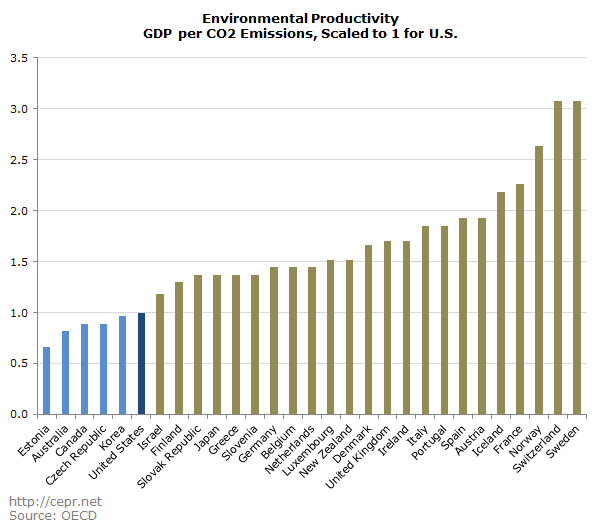February 22, 2016
February 22, 2016
When economists talk about productivity, what they usually mean is “labor productivity.” Labor productivity measures the amount of income produced per hour of work.
The OECD has put out a separate measure called “environmental productivity” which quantifies how much national income is created per kilogram of carbon dioxide emissions. The data is from 2010, and national income is measured in 2005 PPP-adjusted U.S. dollars. In the figure below, the results have been indexed to 1 for the United States. The countries with a light blue bar have lower environmental productivity than the U.S.; countries with a dark blue bar have equal environmental productivity; and countries with a dark tan bar have higher environmental productivity. The graph only includes countries deemed to be “advanced economies” by the IMF.
There are a few distinct takeaways from the graph. First, the U.S. has relatively low environmental productivity. The median country in the sample — Belgium — is over 40 percent more productive that the U.S. That is, it creates over 40 percent more income for every unit of CO2 emissions. This suggests that the U.S. has substantial room to decrease emissions, boost national income, or do some combination of the two through greater efficiency.
Second, these environmental productivity scores may be informative in determining which countries can or should reduce their emissions under any sort of global climate accord. The high degree of dispersion in environmental productivity suggests that an across-the-board mandate to reduce emissions would not affect all countries equally. For countries where GDP is only weakly correlated with CO2 emissions, cuts may be easy. However, for countries where CO2 emissions are part of an important industrial process — whether those emissions are used in an efficient way or not — high-efficiency countries will actually be hurt the most by emissions reductions. This is because each unit of emissions yields greater national income in those countries. Emissions reductions will do the least damage in countries where emissions are less productive.







